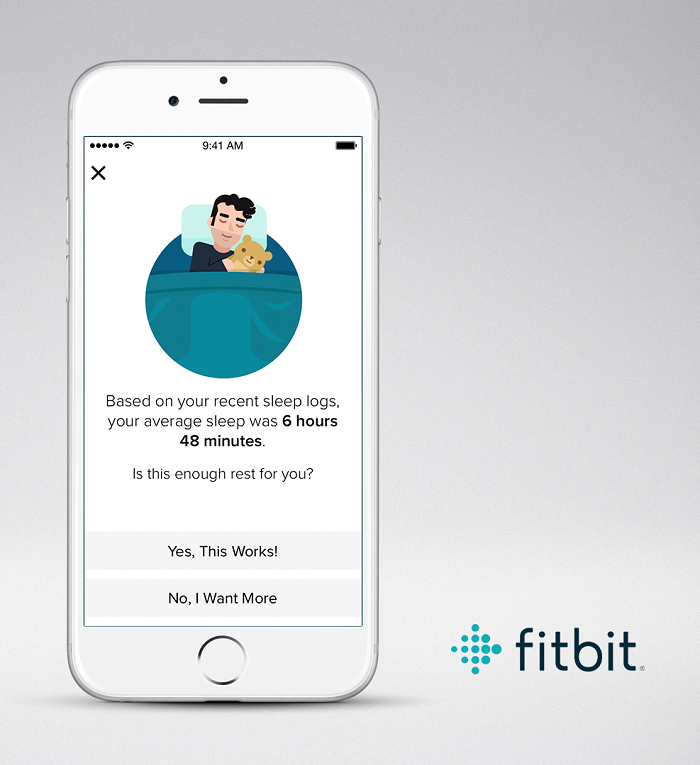Fitbit, the leader in the connected health and fitness market,released a simple yet powerful set of sleep tools to help millions of Fitbit users around the world improve their sleep consistency and overall health.Sleep plays a critical role in health and well being, from protecting against cardiovascular disease, diabetes and obesity, to boosting neurocognitive functions, mental health and longevity. Available today on the free Fitbit® appand compatible with all Fitbit devices that track sleep, Fitbit’s new Sleep Schedule feature helps guide you to get a more consistent pattern of sleep with:
- Personalized sleep goals based on your sleep data to achieve your optimal amount of sleep each night.
- Customized bedtime and wakeup targets to establish sleep consistency.
- Reminders to stay on schedule, and a sleep schedule history to chart your progress.
These tools are the first in a series of new sleep features being developed in collaboration with Fitbit’s new panel of leading sleep experts that includes Drs. Michael Grandner at the University of Arizona, Allison Siebern at Stanford University,and Michael Smith at Johns Hopkins University.
The Fitbit app is a vital part of the Fitbit platform consisting of devices, apps, social and motivational features, advice and personalized coaching which is continually getting smarter and easier to use with features like automatic sleep tracking and exercise recognition to make tracking your health and fitness effortless. Working in harmony, the Fitbit platform helps people make behavioral changes to be more active, exercise more, eat smarter, track their sleep and manage their weight. While many people understand the benefits and importance of a good night’s sleep for their health, getting enough sleep (7 to 9 hours[2]) and regularly going to bed around the same time each night can be a challenge.
According to Fitbit’s sleep experts, adhering to a consistent sleep routine is one of the most important things people can do to improve their sleep: “If you’re constantly changing your sleep routine, it can have the same effect as giving yourself jetlag because you are continually changing your circadian rhythm, also known as your internal clock, which can negatively impact your health and wellness,” said Michael Grandner, PhD, MTR, CBSM. “To improve your physical performance, mental health and cognitive functions, you should aim to get a sufficient amount of sleep each night and be consistent with the times you go to sleep and wake up each day. Fitbit’s new Sleep Schedule tool makes it easier for people to see how much sleep they’re actually getting in order to establish a healthy routine this has the potential to help millions of people around the world improve their sleep and overall wellbeing, which is really exciting.”

Research has shown that getting enough sleep can also positively impact how much you exercise the next day and is vital to post-training recovery, playing an integral role in the body’s ability to repair itself. Additionally, Fitbit data also shows a correlation between consistent bedtimes and daily active minutes, especially for users who go to bed early each night. Users who sleep an average of 7 to 9 hours nightly also have a lower body mass index(BMI) than those who sleep only 3 to 4 hours per night, while those who are overweight or obese (BMI over 25) on average sleep over an hour (70 minutes) less per week than those with a normal BMI (BMI 18.5-25).[5]
“What’s great about the new Fitbit Sleep Schedule feature is that it looks at your sleep data from your Fitbit device you’re wearing day and night, analyzes it for patterns and creates a personalized schedule just for you,” said Tim Roberts, Executive Vice President, Interactive at Fitbit. “This is a great example of how we’re providing guidance using Fitbit data to help millions of people develop healthier habits and routines, and is just the first in a series of new sleep features that we’re working on to help our users improve their health through data and coaching.”
The new Sleep Schedule features on the Fitbit app will help you meet your sleep goals and maintain a more consistent pattern of sleep through these tools:
- Sleep Goal:Based on your sleep data from your Fitbit tracker, you can follow the app’s personalized recommendations or set your target number of hours to make sure you’re getting enough sleep each night.
- Bedtime and WakeUp Targets:Based on your sleep goal and past sleep behavior from your Fitbit tracker, the app will recommend target bedtime and wake up times. You can customize these based on your personal preferences and schedule.
- Bedtime and Wake Up Reminders: To help you reach your sleep goal and regularly go to bed and wake up more consistently, you can receive push notification reminders on your smartphone. You can also set a silent wake alarm on your Fitbit tracker based on your wake up target.
- Sleep Schedule History Chart:Track your sleep consistency over time to determine if you’re meeting your goals or if you need to adjust your sleep schedule.
Available now on the top-downloaded free Fitbit app for Android, iOS and Windows devices, the new Sleep Schedule feature works with all Fitbit devices that automatically track sleep, including Fitbit Surge™, Fitbit Blaze™, Fitbit Charge HR™, Fitbit Alta™, Fitbit Charge™, Fitbit Flex® and through manual sleep tracking with Fitbit One®.

